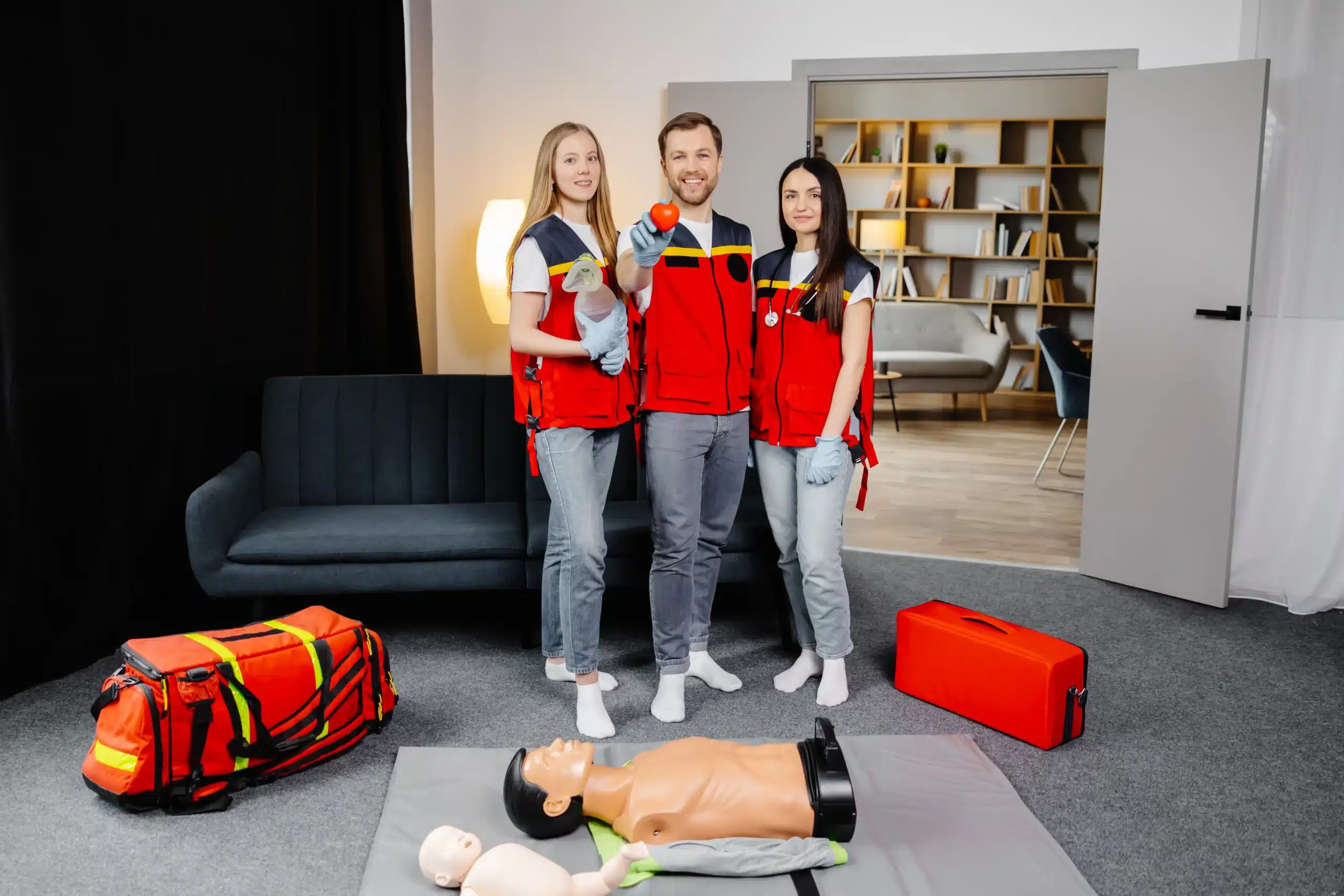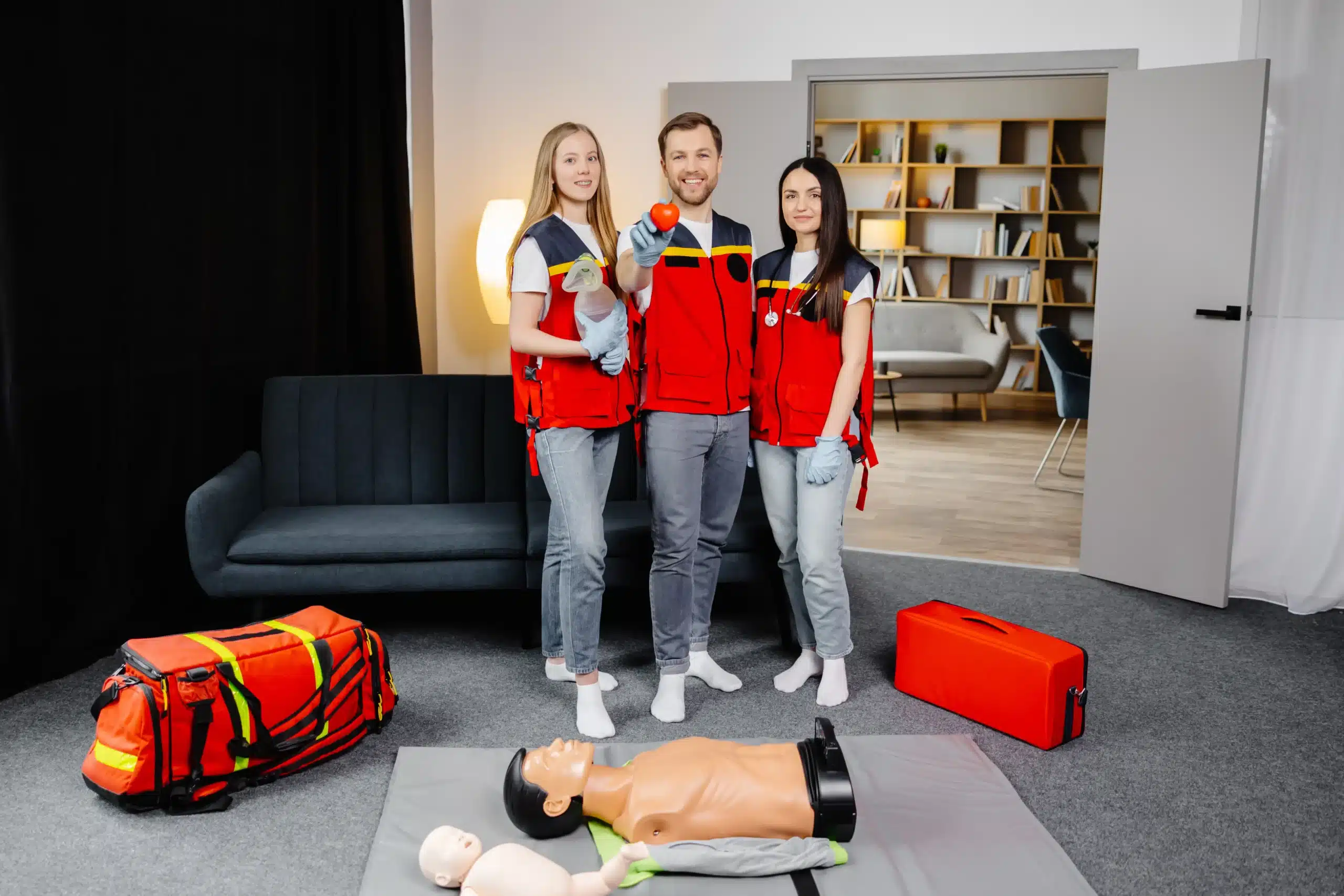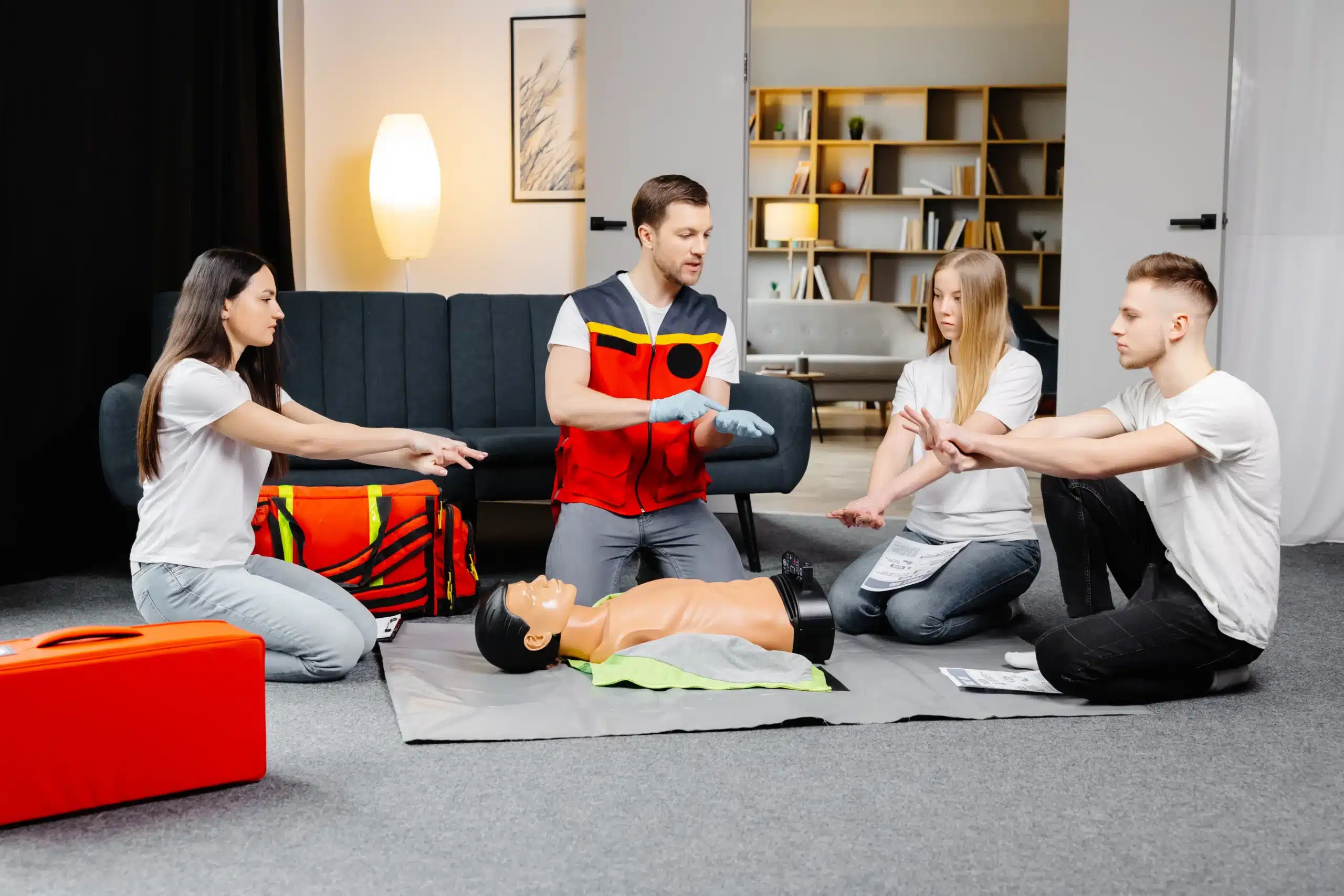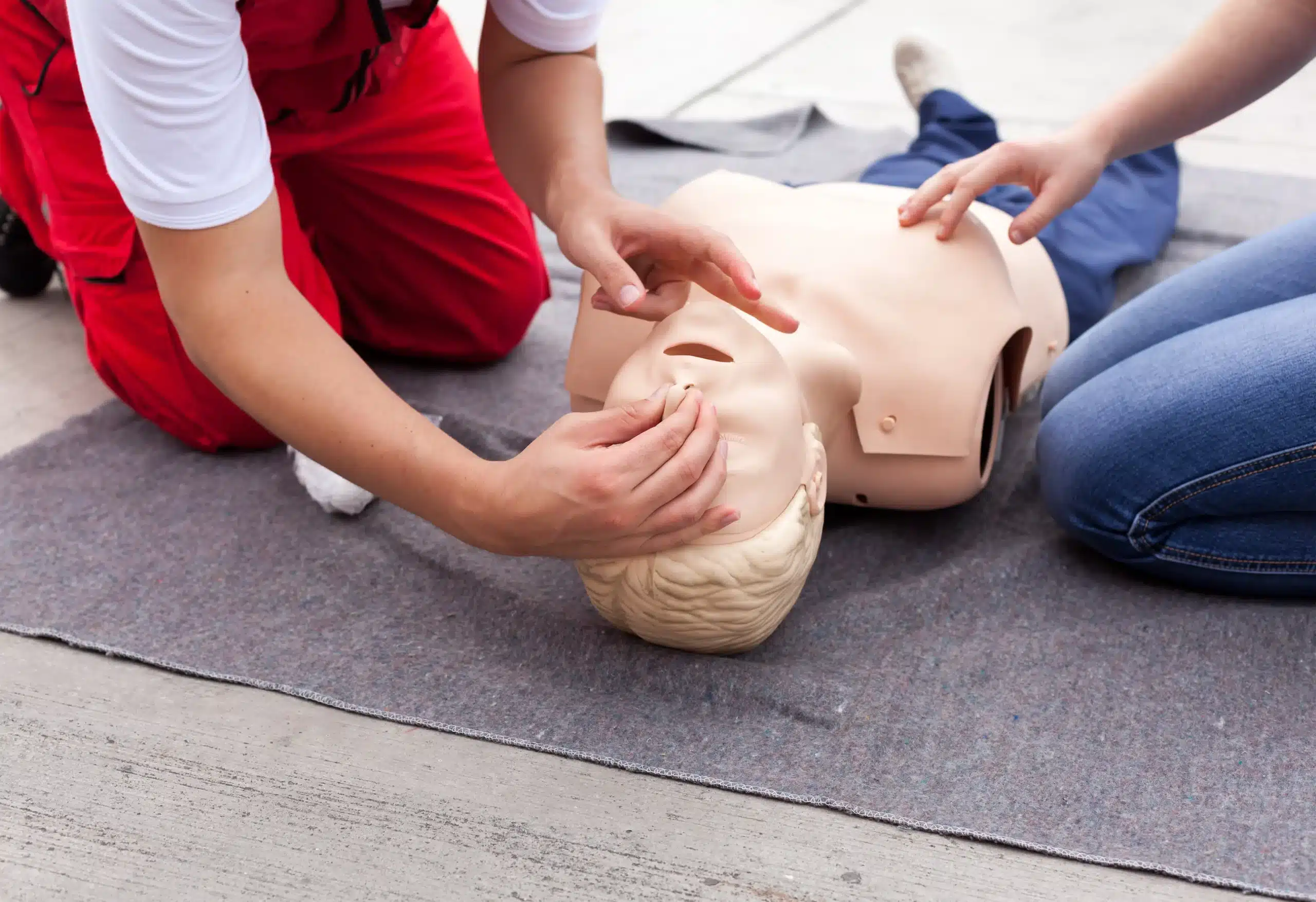For healthcare providers in Napa, staying ahead in your career often means pursuing advanced certifications. ACLS, or Advanced Cardiovascular Life Support, is one such certification that can significantly enhance your skills and open new career opportunities. This guide provides a complete overview of ACLS, from understanding its core concepts to finding the best ACLS courses in Napa that fit your schedule and learning style. We’ll explore the key differences between BLS, ACLS, and PALS, discuss the career benefits of ACLS certification, and offer practical tips for preparing for your ACLS course. Whether you’re a seasoned professional or new to advanced cardiac care, this guide will help you navigate the world of ACLS and maximize your career potential.
Key Takeaways
- ACLS certification advances your healthcare career: It provides the skills to handle complex cardiovascular emergencies, making you a valuable asset in critical situations and opening doors to new opportunities. Complement ACLS with BLS and PALS to broaden your expertise.
- Find the right ACLS course in Napa: Explore various providers, including Safety Training Seminars and Napa Valley College, considering factors like cost, schedule, and instructor experience to choose the best fit for your learning style.
- Prepare for success and stay up-to-date: Familiarize yourself with the ACLS Provider Manual, utilize practice tests and online resources, and consider a review course to solidify your knowledge. Ongoing learning and networking are crucial for maintaining proficiency and career growth.
What is ACLS?
What is ACLS and who needs it?
ACLS stands for Advanced Cardiovascular Life Support. It’s a medical certification required for many healthcare professionals. This training builds upon the foundational skills learned in Basic Life Support (BLS) with more advanced interventions and procedures. Think of it as leveling up your life-saving abilities. While BLS focuses on immediate response, ACLS equips you to handle complex cardiovascular emergencies. Professionals who often need ACLS certification include physicians, nurses, paramedics, respiratory therapists, and other specialized healthcare providers. It’s essential for anyone regularly involved in managing patients experiencing heart attacks, strokes, and other serious cardiovascular conditions. If you’re looking to advance your career in these fields, an ACLS certification is often a must-have.
ACLS vs. BLS & PALS: Key Differences
Understanding the distinctions between BLS, ACLS, and PALS (Pediatric Advanced Life Support) can help you determine which course best suits your needs. BLS provides the fundamental skills needed to respond to life-threatening emergencies, including CPR for adults, children, and infants, how to handle choking, and how to use an AED. ACLS training builds upon this foundation, focusing on advanced techniques for managing severe heart problems like heart attacks and strokes. This includes airway management, administering specific medications, and performing complex resuscitation methods. PALS is specifically tailored to the unique needs of infants and children facing life-threatening illnesses or injuries. Each certification plays a vital role, and many healthcare providers pursue all three to be fully prepared. You can find more information on our BLS course and our PALS course on our website.
Career Benefits of ACLS Certification
Holding an ACLS certification demonstrates a commitment to excellence in patient care and can significantly enhance your career prospects. It signifies that you possess the advanced knowledge and skills to handle critical cardiac events, making you a valuable asset to any healthcare team. ACLS certification can open doors to new opportunities, increase your earning potential, and allow you to provide a higher level of care. It’s an investment in your professional development that can pay dividends throughout your career. Consider taking our ACLS class to enhance your skills and advance your career.
Find Top ACLS Courses in Napa
Finding the right ACLS course can feel overwhelming, but several excellent options are available in Napa. Here’s a rundown of local providers to help you start your search.
Safety Training Seminars
Safety Training Seminars, a woman-owned business, offers various American Heart Association courses, including BLS, ACLS, PALS, CPR, and First Aid. Their convenient Napa location and daily classes make scheduling easy. They also pride themselves on providing excellent customer service and competitive pricing.
Napa Valley College CPR Training Center
Another option is the Napa Valley College CPR Training Center. As an American Heart Association certified training center, they offer various courses, including BLS CPR & AED, ACLS, and PALS. Check their website for their current course schedule.
American Heart Association Training Centers
For healthcare professionals seeking in-depth training, ACLS certification is essential. It provides the advanced cardiac life support techniques necessary to handle emergencies confidently and competently. You can find a comprehensive list of AHA Training Centers on the American Heart Association website.
Bay Area CPR
Bay Area CPR offers AHA-certified BLS, ACLS, PALS, and CPR/First Aid classes in Napa. With daily classes and the option for on-site training at your location, they offer flexible options for busy professionals and groups.
In Home CPR
If you prefer a more personalized approach, consider In Home CPR. Chris Schlesinger and his team provide in-home CPR training throughout the San Francisco Bay Area and Sacramento, bringing the classroom to you. This option is ideal for those who prefer a comfortable, familiar learning environment.
Online vs. In-Person ACLS: Pros and Cons
Deciding between online and in-person ACLS courses depends on your learning style and schedule. Online courses offer flexibility, while in-person training provides valuable hands-on practice. Consider what works best for you. Many students find that using mobile apps can be helpful for learning and reviewing ACLS algorithms, regardless of the course format you choose. For tips on succeeding in online learning, check out this resource.
ACLS Course Structure & Pricing
Duration, Schedule & Flexibility
ACLS courses at Safety Training Seminars are designed to fit your busy schedule. Classes are conveniently located at 2011 Soscol Ave, Suite 7, Napa, CA 94558 and run daily from 8 am to 10 pm. This flexibility allows you to choose a time that works best, whether you prefer a weekday or weekend class. Check the Safety Training Seminars website for specific dates and times.
Key Topics & Hands-on Learning
The ACLS course covers essential topics, providing the knowledge and skills to handle complex cardiovascular emergencies. As an American Heart Association (AHA) certified training center, Safety Training Seminars follows AHA guidelines, ensuring high-quality instruction. The course emphasizes hands-on learning, allowing you to practice essential skills like airway management, rhythm recognition, and team dynamics. You’ll work with experienced instructors in a supportive environment to build confidence and competence in advanced cardiovascular life support. Explore the ACLS course details to learn more.
Costs, Discounts & Certification
Safety Training Seminars offers competitive pricing for their ACLS courses. Contact them directly to inquire about current pricing and any available discounts. Upon successful completion, you’ll receive an official American Heart Association ACLS certification card, valid for two years. This nationally recognized certification demonstrates your proficiency in advanced cardiovascular life support.
Renewing Your ACLS Certification
Maintaining your ACLS certification is crucial for staying current with the latest guidelines. When it’s time to renew, Safety Training Seminars offers ACLS renewal courses to help maintain your skills and credentials. The renewal process typically involves a shorter refresher course, covering key updates and reinforcing essential techniques. Review the renewal guide or contact them for more information on options and requirements.
Prepare for Your ACLS Course
Getting ready for your ACLS course can make a real difference in how well you absorb the information and perform on exam day. Whether you’re a seasoned healthcare provider or relatively new to advanced cardiac life support, preparation is key.
Prerequisites & Study Materials
Before you begin your ACLS course, it’s helpful to have a solid foundation in basic life support (BLS). A current BLS certification is often a prerequisite, so make sure you’ve got that covered. Familiarizing yourself with the ACLS Provider Manual beforehand is also a smart move. This gives you a head start on the core concepts and algorithms you’ll be learning. Supplemental study materials and practice resources are readily available online.
Master ACLS Concepts: Tips & Tricks
Successfully completing your ACLS course involves more than just memorization. Really understanding the algorithms and how to apply them in different emergency scenarios is crucial. Practice tests are incredibly valuable for identifying your strengths and weaknesses. Many online resources offer practice tests and simulated scenarios to help you hone your skills. Consider supplementing your online learning with an ACLS review course for hands-on practice and expert guidance. This can be especially beneficial for reinforcing your knowledge and building confidence for the exam.
Common Challenges & Solutions
One common challenge students face is the sheer volume of information covered in the ACLS course. Creating a study schedule and breaking down the material into manageable chunks can help you avoid feeling overwhelmed. Effective study strategies can make a big difference in your overall learning experience. Another potential hurdle is applying the algorithms in real-time scenarios. Mobile apps designed for ACLS algorithms can be a great tool for practicing and quickly referencing information when needed. Remember, the goal is not just to pass the exam, but to confidently apply these life-saving skills in real-world situations.
Choose the Right ACLS Course in Napa
So you’re ready to sign up for your ACLS training? Great! Choosing the right course is an important step. Here are a few things to keep in mind as you explore your options in Napa.
Choosing an ACLS Provider: Factors to Consider
Finding a reputable provider is key. Look for organizations with a strong track record and certifications from recognized bodies like the American Heart Association (AHA). Safety Training Seminars offers AHA-certified courses and prioritizes community safety. Reading online reviews can give you a sense of other students’ experiences. Consider factors like class location, schedule flexibility, and overall course structure to find the best fit.
Accreditation & Instructor Qualifications
Accreditation matters. Make sure the provider you choose is accredited by a respected organization. The AHA’s Resuscitation Quality Improvement (RQI) program is a widely recognized, modern approach to training and a popular choice for healthcare professionals seeking BLS, ACLS, and PALS certification. The instructors’ qualifications are equally important. Experienced instructors, like Chris Schlesinger and his team, who offer training throughout the Bay Area and Sacramento, can significantly impact your learning experience.
Course Quality & Participant Feedback
Before committing to a course, see what past participants have to say. Positive feedback often highlights the effectiveness of a program. Look for comments about the practical skills taught, the instructors’ approach, and the overall learning environment. Knowing that others have had a positive experience can increase your confidence in choosing the right course. These courses teach life-saving skills, so finding a program that delivers on its promises is essential. Check out online reviews and testimonials to understand the quality of different ACLS courses in Napa. Yelp can be a helpful starting point.
Maximize Your ACLS Certification
Using ACLS Skills in Real-World Situations
ACLS training goes beyond the classroom—it prepares you for real-world medical emergencies. The skills you gain, such as assessing a patient’s condition, administering medications, and managing airways, directly translate to better patient outcomes in critical situations. Regularly reviewing and practicing these skills can build your confidence and improve your response time when every second counts. Consider participating in mock codes or simulations to reinforce your training and keep your skills sharp. This preparation helps professionals deliver high-quality care in high-pressure environments.
Continuing Education & Staying Up-to-Date
The medical field is constantly evolving, with new research, updated guidelines, and advanced techniques emerging regularly. Staying current with these changes is crucial for providing the best possible patient care. Your ACLS certification is not just a one-time achievement; it’s a commitment to ongoing learning. Take advantage of continuing education opportunities, attend workshops, and stay informed about the latest advancements in cardiovascular care. This dedication to lifelong learning will enhance your skills and demonstrate your commitment to excellence.
Networking in Healthcare
Earning your ACLS certification opens doors to valuable networking opportunities. Connect with fellow healthcare professionals, share experiences, and learn from each other’s expertise. Consider joining professional organizations or attending industry conferences to expand your network. These connections can provide support, mentorship, and access to new career opportunities. Building a strong professional network can enrich your career and provide valuable resources.
Related Articles
- ACLS Courses in Vallejo: Your Complete Guide – Napa CPR Classes
- Online ACLS Classes in Napa: Your Guide – Napa CPR Classes
- AHA ACLS Classes in Napa, CA – Napa CPR Classes
- BLS, ACLS, PALS, CPR & First-aid Classes in Napa, CA
- ACLS Renewal in Napa: Your Complete Guide – Napa CPR Classes
Frequently Asked Questions
What exactly does ACLS training cover?
ACLS training dives into advanced life-saving techniques for managing serious heart problems like heart attacks and strokes. It covers essential skills such as airway management, recognizing and treating abnormal heart rhythms, administering appropriate medications, and working effectively as part of a resuscitation team. It builds upon the foundational skills learned in BLS (Basic Life Support) and equips you to handle more complex cardiovascular emergencies.
How do I choose the right ACLS course in Napa?
Look for training centers certified by reputable organizations like the American Heart Association. Check if the course schedule and location work for you. Consider the instructors’ experience and teaching style, and don’t hesitate to read reviews from past students. Think about whether you prefer in-person, hands-on learning or the flexibility of an online course. Finally, compare pricing and make sure the course fits your budget.
I’m already BLS certified. Why do I need ACLS?
While BLS provides a fundamental understanding of life support, ACLS takes your skills to the next level. It prepares you for more complex cardiovascular emergencies and equips you with the knowledge and techniques to manage critical situations effectively. For many healthcare professionals, ACLS certification is a requirement and demonstrates a commitment to advanced patient care.
How can I prepare for my ACLS course?
A solid foundation in BLS is a great starting point. Review the ACLS Provider Manual beforehand to familiarize yourself with the material. Take practice tests to identify areas where you need to focus your study efforts. Consider using mobile apps to review algorithms and key concepts. If you learn best in a structured environment, an ACLS review course can provide valuable hands-on practice and expert guidance.
How often do I need to renew my ACLS certification?
ACLS certifications are typically valid for two years. To maintain your credentials and stay up-to-date with the latest guidelines, you’ll need to complete a renewal course before your current certification expires. Renewal courses are often shorter than the initial certification course and focus on key updates and essential techniques.






